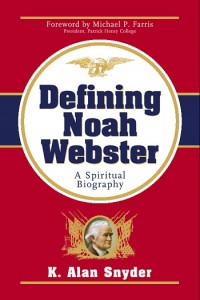Yesterday I encouraged those of you who need more information on how the Bible views government to purchase a copy of my book If the Foundations Are Destroyed: Biblical Principles and Civil Government. Today, let’s focus more historically.
 My doctoral dissertation was on a man who was highly influential in America’s formative years: Noah Webster. That dissertation was published as Defining Noah Webster: A Spiritual Biography. I’ve always thought the title was rather clever, given that Webster’s primary work for which he is remembered is the first American dictionary. But he did so much more.
My doctoral dissertation was on a man who was highly influential in America’s formative years: Noah Webster. That dissertation was published as Defining Noah Webster: A Spiritual Biography. I’ve always thought the title was rather clever, given that Webster’s primary work for which he is remembered is the first American dictionary. But he did so much more.
Long before publishing his 1828 dictionary, he wrote the first American speller, a book that could be found in nearly every family’s home from the cultured environs of Boston and New York to the frontiers of what we now call the Midwest. Pioneer families would carry their Bible and Webster’s Speller.
Webster later became a newspaper editor during the tumultuous years of the 1790s, then an author of a multitude of school books that became familiar to thousands of students prior to the Civil War.
The centerpiece of this work, though, is Webster’s Christian conversion at age 50, a conversion that altered his thinking on government, education, and morality. His famous dictionary was also a treatise for the Christian faith. I have an entire chapter that explains how he accomplished that goal. The conversion and how it affected him is why the subtitle of the book is A Spiritual Biography.
Even though it was originally a doctoral dissertation, I think you’ll find it highly readable. I had that in mind while writing it. To me, it’s such a waste to spend all that effort researching and writing, only to have a committee of three historians read the final product, and then have it fade into oblivion. I wrote this book with the intention of publishing it, and deliberately diminished what some might call “dissertationese.” I believe it’s a fascinating account of the life of a man few know, but with whom we should become better acquainted.
